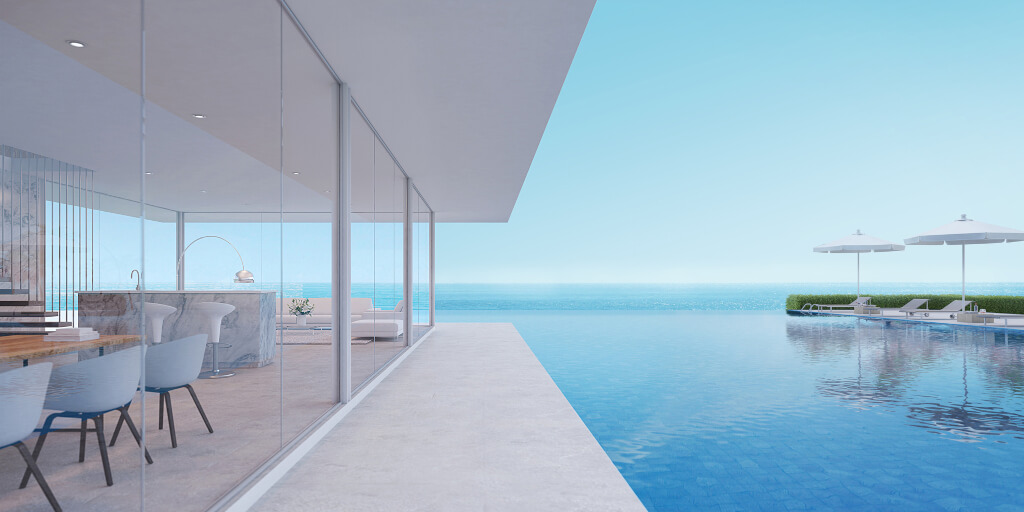South Africa’s high-end real estate market is unusually stable during the current economic downturn.
Recent events have focused the country’s attention on a spectacular property in Cape Town, which boasts a breathtaking ocean view. The R200 million purchase tag, combined with its breathtaking beauty, sent shockwaves through South African social media, especially TikTok.
Investigating the R200 Million Cost
Because of its spectacular vistas of the Atlantic Ocean and the mountains that are so characteristic of Cape Town, the mansion, which was highlighted on TikTok by the user “forex_genie,” is the perfect symbol of wealth. The property’s allure stems, in part, from the dialogue it maintains with the surrounding environment thanks to its glass walls and large garden.
However, other South Africans are surprised by the astronomical price and have been seen saying things like, “I better get the ocean with that price.” But how much justification is there for such a high price? To get a handle on this, we need to learn more about the finer points of the high-end housing market in South Africa, especially in highly desirable locations like Cape Town.
Cape Town Has Become a Major Market for High-end Housing
Since Cape Town is so well-known for its stunning mountain views and coastlines, it is a haven for high-end real estate investments. Homes in prime locations like Clifton, Bantry Bay, and Camps Bay can cost upwards of a hundred million dollars. Cape Town has more high-end properties than any other city in South Africa, according to data published by New World Wealth.
What makes these homes exceptional are their surroundings, design, and location. The property’s ocean view, location, and the quality of the interior design are all aspects that could contribute to the asking price of R200 million.
Even if most South Africans are having financial troubles right now, the luxury property market continues to be relatively shielded because many people spend up to 80% of their pay in the first few days after getting paid. Although the contrast between the bulk of people who are struggling and the few who are living in luxury may seem glaring, it is a phenomenon that occurs in every country on Earth.
Cape Town’s global profile means it can cater to a wide range of prospective investors. Rich individuals from all over the world flock there because of the unparalleled level of comfort and lifestyle it offers. However, this market is so exclusive that it may not always be representative of the national real estate market as a whole. The rising cost of living has left many South Africans, already struggling to make ends meet, unable to afford such extravagances.
The Investment Potential of the High-End Real Estate Market
The R200 million mansion is not just a luxurious place to live, but also an appreciating asset. Investors find them appealing because of this quality. Such property, especially if it’s in a prime location like Cape Town, might bring in a handsome profit over the years.
An interview with real estate specialist Jane Roberts revealed the following: “Such luxury properties are often purchased as a long-term investment, more so than a residence.” These backers are betting that the city will continue to attract affluent people from all around the world. For this reason, R200 million could seem like a lot to the average person, but from the perspective of an investor, it’s often a calculated risk.
Cape Town’s Luxury Property Investment Market
Beyond its scenic beauty and architectural marvels, Cape Town’s luxury property market holds significant attraction for discerning investors, as it offers potential for both rental returns and capital appreciation.
From an investment standpoint, Cape Town is a real estate haven. As South Africa’s second-largest city and one of its prime tourist destinations, it attracts high-net-worth individuals (HNWIs), both locally and internationally. This, in turn, fuels demand for luxury properties, leading to a resilient market despite national economic downturns.
The city’s luxury market is dominated by high-value areas such as Clifton, Bantry Bay, Camps Bay, Bishopscourt, and Constantia. These neighborhoods are renowned for their ocean views, mountain vistas, and closeness to top-tier amenities, all of which are highly sought after by affluent buyers.
For investors, luxury real estate in these areas promises considerable returns. According to a 2023 report by Pam Golding Properties, the median price of a luxury home in Clifton crossed the R50 million mark, representing an impressive 11% increase year-on-year. Rental yields in these areas also remain strong, with prime properties earning premium rents, further enhancing the investment appeal.
The resilience of Cape Town’s luxury market stems from its diverse buyer base. While a significant portion of buyers are South African HNWIs, there is a growing interest from foreign investors, primarily from Europe and North America. This international demand has played a crucial role in insulating Cape Town’s high-end market from local economic headwinds.
However, it’s worth noting that investing in luxury real estate comes with its unique challenges. Properties in the high-end segment can take longer to sell, leading to potential liquidity issues. Also, the maintenance costs for these properties are often high.
Cape Town’s luxury property market presents an attractive investment proposition for HNWIs seeking long-term capital growth and robust rental returns. However, investors should thoroughly assess the market conditions, property specifics, and financial capability before committing to this segment.
The R200 million Cape Town mansion, therefore, reveals the resilience of South Africa’s luxury property sector, notwithstanding the country’s general economic climate. It’s a constant reminder that the country is highly sought after by the world’s affluent, who see it as more than just a vacation destination. Even though the vast majority of South Africans could never dream of affording such opulence, the luxury property sector remains an integral and distinguishing part of the country’s overall real estate landscape.
About The Author:
Sipho Mabona is an esteemed investment industry specialist and contributing writer for African Nova. His rich experience and deep insights into the African investment landscape, combined with his articulate storytelling, provide readers with valuable knowledge and inspiring success stories.




